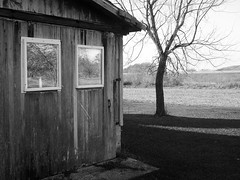Wednesday, February 25, 2009
Tuesday, February 24, 2009
Thursday, February 19, 2009
Seeking a Sign and the Authority of Scripture
Recently I have been thinking about the overarching authority of Scripture and it's command over any experiential citation. Often people proclaim their experiences to be authoritative, but alas, they crumble under the weight of Scripture. The following, although not entirely exhaustive, are my thoughts concerning the preceding.
Seeking an experience, rather than Scripture, for understanding or revelation is warned against directly by Jesus.
Then some of the scribes and Pharisees answered him, saying, “Teacher, we wish to see a sign from you.” But he answered them, “An evil and adulterous generation seeks for a sign, but no sign will be given to it except the sign of the prophet Jonah. For just as Jonah was three days and three nights in the belly of the great fish, so will the Son of Man be three days and three nights in the heart of the earth.
And the Pharisees and Sadducees came, and to test him they asked him to show them a sign from heaven. He answered them, “When it is evening, you say, ‘It will be fair weather, for the sky is red.’ And in the morning, ‘It will be stormy today, for the sky is red and threatening.’ You know how to interpret the appearance of the sky, but you cannot interpret the signs of the times. An evil and adulterous generation seeks for a sign, but no sign will be given to it except the sign of Jonah.” So he left them and departed.
How can I pardon you?
Your children have forsaken me
and have sworn by those who are no gods.
When I fed them to the full,
they committed adultery
and trooped to the houses of whores.
They were well-fed, lusty stallions,
each neighing for his neighbor's wife.
Shall I not punish them for these things?
declares the Lord;
and shall I not avenge myself
on a nation such as this?
So, is it wrong to seek these things? Of course not, but not through experience. The first chapter of Hebrews gives us the exact way that we should seek understanding or revelation.
Long ago, at many times and in many ways, God spoke to our fathers by the prophets, but in these last days he has spoken to us by his Son, whom he appointed the heir of all things, through whom also he created the world.
Just as Jesus gives the Pharisees Scripture when they seek a physical sign, so the author of Hebrews tells us that God now speaks to us through His Son. And I take those to be equal considering John 1,
In the beginning was the Word, and the Word was with God, and the Word was God.
And the Word became flesh and dwelt among us, and we have seen his glory, glory as of the only Son from the Father, full of grace and truth.
Therefore, I take Scripture to be the ultimate authority in every situation. This does not eliminate the possibility that my experiences may hold significance or meaning, but rather that it is Scripture that tells me the significance or meaning of an experience. I then cannot cite an experience as my reason for believing a certain truth, because by doing so I have eliminated the possibility that I regard Scripture to be ultimately authoritative.
In conclusion, I seek understanding and revelation in Scripture alone, and heed experience as an upholder of the truth granted in the Word.
Wednesday, February 18, 2009
Resolution 15
Resolved, never to suffer the least motions of anger towards irrational beings.
"As with all emotion, which exist before words and independently of words, anger is hard to define with words. But we should try because evidently there are different experiences called anger, some of which are sinful and some of which are not. For example, in Mark 3:5 Jesus himself is angered by religious leaders who do not want him to heal a man on the Sabbath. "He looked around at them with anger, grieved at their hardness of heart." And Jesus repeatedly referred to God's anger either directly as the wrath of God in judgment (John 3:36; Luke 21:23) of indirectly in parables (Matt. 18:34; Luke 14:21).
"A standard English dictionary defines anger as "a strong feeling of displeasure and usually antagonism." The reason the phrase "as strong feeling of displeasure" can't stand by itself is that we don't think of really bad tasting food as awakening anger, even though there may be strong displeasure. That displeasure needs another component before it is experienced as anger. If someone keeps feeding us terrible food, and we sense that they are doing it intentionally then we may get angry. Anger seems to be more of less strong displeasure about something that is happening willfully and, we feel, should not be happening.
"Of course, we do sometimes get angry when that is not the case. If we trip over a root, we may turn around and kick the root in anger. If we bump our head on the kitchen cabinet, we may smack the cabinet door in anger. But in our best moments we look at those reactions as foolish. We intuitively sense that we are imputing willfulness to the root and the cabinet, as of they did something to us on purpose.
"This is why the young Jonathon Edwards resolved not to get angry in inanimate objects. His Resolution #15 said, "Resolved, never to suffer the least motions of anger towards irrational beings." Therefore, the difference between anger and other emotions of displeasure is that anger involves strong displeasure with something that is happening intentionally that we think should not be happening."-John Piper, What Jesus Demands from the World
Tuesday, February 17, 2009
Sunday, February 15, 2009
Francis Chan and the Hour of Power
Rebekah and I are spending the weekend in the Twin Cities with my parents and sister. Last night we attended church downtown, freeing up our Sunday to relax and celebrate my mom's birthday which is on Monday.
So, this morning as I was making my way to take a shower I passed my dad flipping through the channels. He looked at me and said rather sarcastically, "We could watch Mac Hammond." I quickly responded, "I'll pass" and continued toward the bathroom. Then I heard a familiar voice. It was Francis Chan. I did not think Cornerstone Church had a Sunday morning program, so I stopped to take a gander. Indeed it was Francis Chan, but he was on the Hour of Power. This seemed paradoxical, so I sat down to watch the program (or what was left of it). I caught the last 10 minutes and it was very good.
Pastor Francis spoke about having an eternal perspective, leaving everything to follow Jesus, and being satisfied in Christ alone which seemed extremely ironic against the gaudy backdrop of exotic plants and an organ the size of Rhode Island in a glass structure that looks more like Paul Bunyan's greenhouse than a church. Maybe that's why I found it to be so interesting. You can watch Pastor Francis on the Hour of Power here or read his message here.
Then, after the message, a song, and a benediction, there was an anticlimactic promotion for a "blessing pillow."
Wednesday, February 11, 2009
Take It Easy
I do not think I will ever employ any of the following phrases when saying goodbye:
- "Take it easy."
- "Take care of yourself."
- Or the shortened version of (2), "Take care."
Tuesday, February 10, 2009
Thursday, February 05, 2009
Going Green and Greener Pastures
Going green sure is the trendy thing to do.
Don't get me wrong. I dig the whole idea of keeping the planet clean, having an environmental mindset, reducing, recycling, and reusing. Great.
Here's were I get confused.
People talk about how they save some paper. Nice work. By saving a piece of paper you just saved about 1/80,500 of a tree. I am not mocking this. I understand that it adds up. A lot of people go to work and school each day and can reduce their paper usage significantly.
Unfortunately it is all thrown away (no pun intended) when a growing number of people auto-start their cars and allow them to run for 30-45 minutes before they leave home or work, or don't even bother shutting the vehicle off when they "quick" run into the grocery store for a half-hour. How counterproductive.
This may be comparing apples and oranges, but they are both environmental issues, right? You wouldn't only take your kid to the doctor for pneumonia and not for a broken arm.
Watch this video and I will make my final point.
It is hip to go green, but only when it serves us well to do so. The planet is cool; saving money for the stuff we want by using energy efficient light bulbs is cooler. Reducing our CO2 emissions is cool; being cold for a shorter amount of time because our vehicles are already warm is cooler.
We may need to evaluate just how green we are going if we aren't making any sacrifices.
Wednesday, February 04, 2009
He Can Make Us Clean
It has been often said that it exhibits little faith to pray for God's will to be done in a sickness situation. Rather it must be prayed that God will heal regardless. Scripture explodes this fallacy.
And behold, a leper came to him and knelt before him, saying, “Lord, if you will, you can make me clean.” And Jesus stretched out his hand and touched him, saying, “I will; be clean.” And immediately his leprosy was cleansed. And Jesus said to him, “See that you say nothing to anyone, but go, show yourself to the priest and offer the gift that Moses commanded, for a proof to them.”
The leper shows extraordinary faith, not because he says that Jesus will heal him, but because he says Jesus can heal him. Jesus acknowledges the leper's faith, as He does with others (Matthew 15:28; Mark 5:24), and says, "I will."
Some may argue that this goes against Hebrews 11:1, "Now faith is the assurance of things hoped for, the conviction of things not seen," but I will argue that it upholds the verse. The leper, being human, undoubtedly hoped that Jesus would heal him, but above the hope of physical healing he put his hope in the unwaivering promises of God by acknowledging that God was able to do all things. Not only that, but by saying what he did, he acknowledged that Jesus was God. That is the faith Jesus sees in the leper.
And because of that faith Jesus commands that the cleansed leper go and proclaim his faith to the faithless. The law required much of a leper after he was made clean.
The Lord spoke to Moses, saying, “This shall be the law of the leprous person for the day of his cleansing. He shall be brought to the priest, and the priest shall go out of the camp, and the priest shall look. Then, if the case of leprous disease is healed in the leprous person, the priest shall command them to take for him who is to be cleansed two live clean birds and cedarwood and scarlet yarn and hyssop. And the priest shall command them to kill one of the birds in an earthenware vessel over fresh water. He shall take the live bird with the cedarwood and the scarlet yarn and the hyssop, and dip them and the live bird in the blood of the bird that was killed over the fresh water. And he shall sprinkle it seven times on him who is to be cleansed of the leprous disease. Then he shall pronounce him clean and shall let the living bird go into the open field. And he who is to be cleansed shall wash his clothes and shave off all his hair and bathe himself in water, and he shall be clean. And after that he may come into the camp, but live outside his tent seven days. And on the seventh day he shall shave off all his hair from his head, his beard, and his eyebrows. He shall shave off all his hair, and then he shall wash his clothes and bathe his body in water, and he shall be clean.
“And on the eighth day he shall take two male lambs without blemish, and one ewe lamb a year old without blemish, and a grain offering of three tenths of an ephah of fine flour mixed with oil, and one log of oil. And the priest who cleanses him shall set the man who is to be cleansed and these things before the Lord, at the entrance of the tent of meeting. And the priest shall take one of the male lambs and offer it for a guilt offering, along with the log of oil, and wave them for a wave offering before the Lord. And he shall kill the lamb in the place where they kill the sin offering and the burnt offering, in the place of the sanctuary. For the guilt offering, like the sin offering, belongs to the priest; it is most holy. The priest shall take some of the blood of the guilt offering, and the priest shall put it on the lobe of the right ear of him who is to be cleansed and on the thumb of his right hand and on the big toe of his right foot. Then the priest shall take some of the log of oil and pour it into the palm of his own left hand and dip his right finger in the oil that is in his left hand and sprinkle some oil with his finger seven times before the Lord. And some of the oil that remains in his hand the priest shall put on the lobe of the right ear of him who is to be cleansed and on the thumb of his right hand and on the big toe of his right foot, on top of the blood of the guilt offering. And the rest of the oil that is in the priest's hand he shall put on the head of him who is to be cleansed. Then the priest shall make atonement for him before the Lord. The priest shall offer the sin offering, to make atonement for him who is to be cleansed from his uncleanness. And afterward he shall kill the burnt offering. And the priest shall offer the burnt offering and the grain offering on the altar. Thus the priest shall make atonement for him, and he shall be clean."
But the law did not heal the leper. Jesus wanted it to be known that it was the power of God that healed the leper. No amount of faith in the law would heal the leper. Only faith in God could do that.
The Bible neither teaches that prayers of healing should be made with the assumption that God will heal nor does the Bible teach that one can be healed by performing the rituals of the law. And nowhere does Scripture teach that we have the power to command God's will by adherence to the law or by presuming healing in prayer.
Tuesday, February 03, 2009
Monday, February 02, 2009
Resolution 14
Resolved, never to do anything out of revenge.
Beloved, never avenge yourselves, but leave it to the wrath of God, for it is written, “Vengeance is mine, I will repay, says the Lord.”







